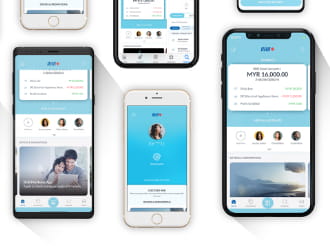OK Kids, Let’s Talk About Money: Instilling Good Financial Habits
As we face the reality that many adults lack financial skills, there’s hope yet for the next generation. Here’s how you can help your kids build good financial habits.
As kids, it’s likely that we were never taught how to manage money. Money just wasn’t something our parents openly discussed with us at the dinner table. The only things we heard were probably “we can’t afford that” or “don’t waste money”, without being given any reason. On the opposite end of the income spectrum, money was never an issue and there was an endless supply from a magic money tree, which wasn’t realistic either. The education system wasn’t much better. We learned everything, except how to manage money.
We had to learn about money management the hard way. We learned through trial and error—a method both fraught with mistakes and often (literally) costly. How many times have we looked at our bank balance and wished we could turn back time to undo those mistakes? Oh, if only I had known!
There’s no point in blaming the past. Here’s what we can do for our kids so they won’t make the same mistakes.
A key aspect of wellbeing
Financial literacy is more than just being able to understand interest/profit rates and stock market basics. It’s about seeing financial health as part of a holistic approach to wellbeing. The connection between financial difficulties and mental health issues is well-documented in psychological research. People facing constant financial strain may experience chronic stress, which can affect both their physical and mental wellbeing.
In today’s fast-paced world, children and teens are often exposed to the hustle culture at an early age through social media. This paints an unrealistic picture of financial security and success, which can be dangerous. They feel they have to be crazy rich to be successful. We’ve seen it materialise in young influencers who scam their followers because they don’t care about the ethical implications of their actions.
Financial security is not being insanely rich; it’s about having control over what you have and making the most of it. When children learn how to manage money effectively, they gain the tools to contribute to their long-term financial stability, which is intrinsically linked to their overall wellbeing. Awareness of proper financial management helps prevent future financial crises and fosters a sense of security and peace. That’s what we need to instil in our kids.
Laying the foundation for responsible decision-making
Building a foundation in responsible decision-making from a young age is imperative. As soon as kids can count, they can learn to manage money.
- Build discipline through delayed gratification and goal setting
Key aspects of financial education include learning to delay gratification and the importance of setting and achieving goals. These skills are vital as they help children understand the value of saving versus immediate spending, and they can make informed choices about purchases. This discipline is crucial for personal development and is a cornerstone of financial literacy.
When your child impulsively asks for a toy they just saw, you can say “We have xx ringgit for toys. If you buy this now, you won’t be able to get that other toy you wanted because you’ve spent the money on this. Why don’t we put this back and save for that one instead?” Set a goal for the needed amount.
If your kids have too many toys they don’t play with, ask them to choose which ones they would like to give away. This will establish an appreciation for what they have. - Be transparent and include them
For older kids, it’s a great idea to be completely transparent with them about your family finances but remember not to attach negative emotions to financial planning. Let them contribute to family budget discussions and in planning vacations. When grocery shopping, ask them to compare the prices, quantity, and quality of the items you usually buy. This teaches them value. Make it a game! Set a budget and a list of items, with the goal of matching or going under the budget. They will feel they have contributed when they see the extra money going into the family holiday budget.
- Discuss investment options
Discussing investment options is also a great way to educate older kids and teens. Go over the pros and cons of the different options and be open to talking about the risks involved. Explain how these investments generate returns and how to look out for scams.
Show them how your own investments are performing. They can try out some of these options with their own pocket money for practical experience. This will give them a good practical understanding of portfolio building, diversification and risk management.
Real life experiences for little ones
While your kindergartener might not be able to build a portfolio just yet, there are ready-made experiences that can help instil good financial skills.
KidZania provides a vibrant, safe, and interactive kid-sized city where kids and teens aged 4 - 14 can engage in various professions, earn a salary, and manage their expenses (like you). This setup mirrors the real world and helps children see the direct consequences of their financial decisions. It’s a controlled environment where the stakes are low, but the learning outcome is significant.
There’s something in it for you, too – peace and quiet. Kick back and relax with a coffee in the kid-free Parents Lounge while the kids “go to work”. And, if you’re an RHB Card/-i holder, you get a special deal.
By starting young, we can nurture a financially savvy generation ready to make responsible decisions and lead secure, happy lives. Enjoy your day at KidZania!
Terms & Conditions apply.

RHB Bank Berhad 196501000373 (6171-M) | RHB Islamic Bank Berhad 200501003283 (680329-V)













